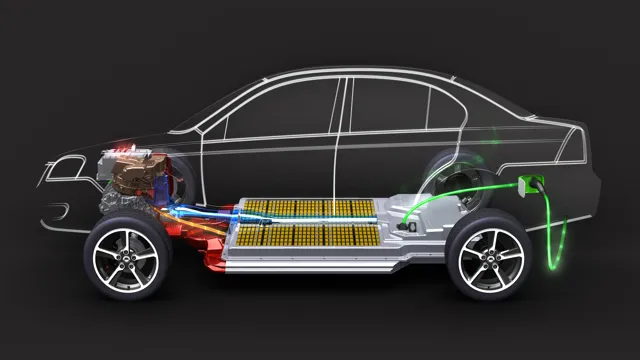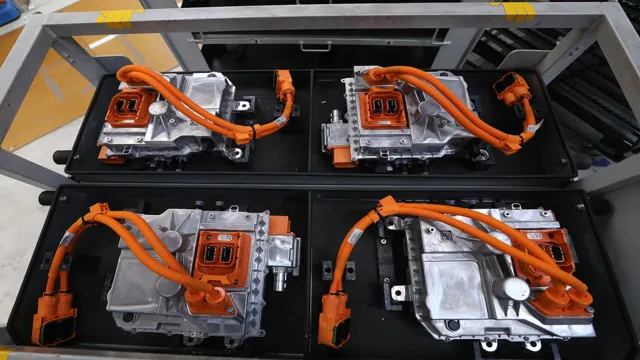Revive Your Electric Car with Battery Replacement – Everything You Need to Know
Have you ever wondered about replacing the battery of an electric car? Well, you’re not alone. Many people are curious about this topic since electric cars are becoming more popular these days. As the popularity of electric cars increases, many individuals are interested in knowing whether or not it is possible to replace the batteries.
The good news is, electric car batteries can be replaced. However, there are some factors that you need to consider before doing so. This blog post will explore whether electric car batteries can be replaced, what factors you should consider, and why it is important to know about this topic.
Overview
When it comes to electric cars, one of the most frequently asked questions is whether or not the batteries can be replaced. The good news is that yes, batteries can be replaced in electric cars. In fact, many automakers offer battery replacement programs for their electric vehicles.
However, it’s worth noting that replacing the battery can be an expensive process, and it may not be necessary until the car has been in use for many years. Additionally, some electric cars have batteries that are designed to last for the life of the vehicle, so replacement may not be needed at all. Ultimately, whether or not you should replace the battery in your electric car will depend on a variety of factors, including the age and condition of your car as well as your driving habits.
Electric Car Battery Life
When it comes to electric cars, one of the most crucial factors to consider is the battery life. After all, the battery plays a significant role in determining the range of the vehicle and how long it can be used before needing a recharge. On average, electric car batteries are designed to last between 8 and 10 years, though this can vary depending on a range of factors such as driving habits, the climate, and how often the vehicle is charged.
As such, it’s essential to maintain your electric car’s battery to extend its lifespan. This includes avoiding overcharging, not letting it run down to empty, and storing the vehicle in a cool, dry place when not in use. By taking proper care of your electric car battery, you can ensure that your vehicle’s range stays consistent and dependable for years to come.

Importance of Battery Replacement
“battery replacement” Overview: Battery replacement is a crucial issue that most people tend to overlook. Batteries have a significant impact on the functioning of our electronic devices, as well as our personal safety. In today’s fast-paced world, we rely heavily on gadgets that run on batteries, from our phones to our cars.
However, batteries have a limited lifespan, and if they’re not replaced, they can result in catastrophic consequences. A weak or dead battery can cause your phone to shut down unexpectedly, your car to break down during a journey, and your smoke detector to malfunction. Therefore, it’s crucial to understand the importance of battery replacement and how it can save you from unforeseen problems.
Types of Electric Car Batteries
Yes, batteries can be replaced in electric cars, but it’s important to understand the different types of electric car batteries first. There are two main types of electric car batteries: lithium-ion and nickel-metal-hydride. Lithium-ion batteries are the most common and they offer a higher energy density, longer lifespan, and faster charging times compared to nickel-metal-hydride batteries.
On the other hand, nickel-metal-hydride batteries are less expensive and more stable, but they have a lower energy density and shorter lifespan. While replacing an electric car battery can be a costly and time-consuming process, it’s important to keep in mind that the battery is the heart of the car and it’s necessary for its performance and longevity. So, if your electric car’s battery is showing signs of wear and tear, it’s best to consider replacing it sooner rather than later.
Lithium-Ion Batteries
Lithium-ion batteries are one of the most popular types of batteries used in electric cars. These batteries are light, powerful, and long-lasting, making them ideal for powering electric cars. Lithium-ion batteries are made up of cells containing lithium-ion, which generates electricity as it moves from the anode to the cathode.
There are different types of lithium-ion batteries, and each has its unique properties. For instance, some types are designed for use in high-performance vehicles, while others are more suitable for use in city cars. Lithium iron phosphate (LiFePO4) is one of the most commonly used types of lithium-ion batteries for electric cars.
It’s safe, long-lasting, and offers excellent performance. Other types of lithium-ion batteries include Lithium Nickel Cobalt Aluminum Oxide (NCA), Lithium Cobalt Oxide (LCO), and Lithium Manganese Oxide (LMO). It’s worth noting that while lithium-ion batteries have many advantages, they also have some limitations, such as high cost, limited range, and the need for proper disposal.
However, the benefits outweigh the drawbacks, making lithium-ion batteries one of the best options for electric cars.
Nickel-Metal Hydride Batteries
Nickel-metal hydride batteries, or NiMH batteries, are one of the several types of batteries used in electric cars. These batteries are similar to the nickel-cadmium batteries that they replaced in the 1990s, but they offer a higher energy density which means that they can store more energy in a smaller size. NiMH batteries are also more environmentally friendly as they do not contain the toxic cadmium that nickel-cadmium batteries do.
These batteries are known for their longevity and reliability, making them a popular choice for electric vehicles. While their popularity has waned in recent years due to the emergence of newer, more efficient battery technologies, NiMH batteries are still used in some hybrid and electric vehicles today. NiMH batteries are a crucial part of the electric vehicle landscape as they offer a reliable and cost-effective solution for transportation without relying on fossil fuels.
Lead-Acid Batteries
Lead-Acid Batteries are one of the most commonly used types of electric car batteries. These batteries consist of lead plates in a sulfuric acid solution, which produces a chemical reaction that generates electricity. Lead-acid batteries are relatively inexpensive and have been used in vehicles for many years, which is why they are a popular choice for electric cars.
However, they are also quite heavy and bulky, which can affect the overall performance and efficiency of the vehicle. Additionally, lead-acid batteries are not very environmentally friendly, as they contain hazardous materials that can be harmful if not disposed of properly. Despite these drawbacks, lead-acid batteries still have their place in the electric car industry due to their affordability and reliability.
How to Replace Electric Car Batteries
Yes, batteries can be replaced in electric cars, but it’s not as straightforward as changing a regular car battery. Electric cars use large, lithium-ion battery packs that power the vehicle’s motor and electronics. Over time, these batteries can lose their capacity and need to be replaced.
The good news is that most electric car manufacturers offer battery replacement options. However, it can be a costly and time-consuming process. Depending on the make and model of your electric car, the cost of a replacement battery pack can range from a few thousand dollars to tens of thousands of dollars.
Additionally, the process requires specialized equipment and technicians with extensive knowledge of electric car systems. It’s important to research and compare options before deciding to replace your electric car battery, as the cost and inconvenience may outweigh the benefits. Overall, while batteries can be replaced in electric cars, it’s important to consider the potential cost and logistics before making a decision.
Professional Replacement Services
Electric Car Batteries When it comes to replacing electric car batteries, it’s important to seek professional help. Although some may attempt to do it themselves, replacing electric car batteries can be dangerous for those who aren’t experienced. The process involves removing heavy and electrically charged batteries that require precision and care.
Therefore, it’s essential to find a reliable technician who can assess and replace your batteries safely. They’ll be able to check the condition of the batteries, remove them, and install new ones without causing any damage to the vehicle. Replacing an electric car battery shouldn’t be taken lightly, but a professional replacement service can ensure a smooth and safe process.
So, remember, always rely on an experienced professional to replace your electric car batteries to ensure that the process is done safely and efficiently.
DIY Replacement Tips
Replacing an electric car’s battery can seem daunting, but with the right tools and knowledge, it can be a DIY project for some. The first step is to identify which type of battery your car requires, as there are different forms and sizes. Once you have the right battery, turn off the car and disconnect the negative cable from the old battery.
Then, remove any retaining screws or clamps, and carefully take out the old battery. Install the new battery in the same position and reattach any screws or clamps. Finally, reconnect the negative cable, and you’re done! It’s essential to remember that electric car batteries are heavy and can be hazardous if not handled with care, so always wear protective gear and use caution.
With these steps in mind, you can replace your car battery quickly and efficiently, saving money from a professional mechanic’s service.
Cost of Electric Car Battery Replacement
Many people wonder if the batteries in electric cars can be replaced, and the answer is yes. However, the cost of replacing an electric car battery can be quite high, ranging from a few thousand dollars up to the price of a new car. The cost varies depending on the make and model of the vehicle, as well as the type of battery used.
Lithium-ion batteries, which are commonly used in electric cars, can also degrade over time, which means they will eventually need to be replaced. However, it’s important to keep in mind that the lifespan of an electric car battery is typically longer than that of a traditional gasoline engine, and the cost of maintenance is generally lower with an electric car. Overall, while battery replacement is a possibility for electric car owners, it’s important to factor in the potential cost when deciding whether to purchase an electric vehicle.
Conclusion
In conclusion, can batteries be replaced in electric cars? The answer is a resounding yes! Just like how people change the batteries in their TV remote when it runs low, the batteries in electric cars can be swapped out for new ones. It’s important to note that the cost of replacing a battery in an electric car can be quite high, but it’s important to keep in mind the long-term benefits of reducing emissions and saving money on gas. So, don’t let the fear of replacing batteries in electric cars deter you from joining the electric vehicle movement.
After all, isn’t it time we started seeing the world in a different light?
FAQs
Can the batteries be replaced in an electric car?
Yes, the batteries in electric cars are replaceable. However, it can be an expensive and time-consuming process.
How often do electric car batteries need to be replaced?
The lifespan of an electric car battery can vary depending on usage and brand, but they typically last between 8-10 years before needing to be replaced.
Can I replace the battery myself or do I need to go to a dealership?
It is not recommended to replace the battery yourself as it can be dangerous and may void the car’s warranty. It’s best to take your electric car to a certified dealership for battery replacement.
How much does it cost to replace an electric car battery?
The cost of replacing an electric car battery can vary depending on the car’s make and model, but it typically ranges between $5,000 to $15,000.







